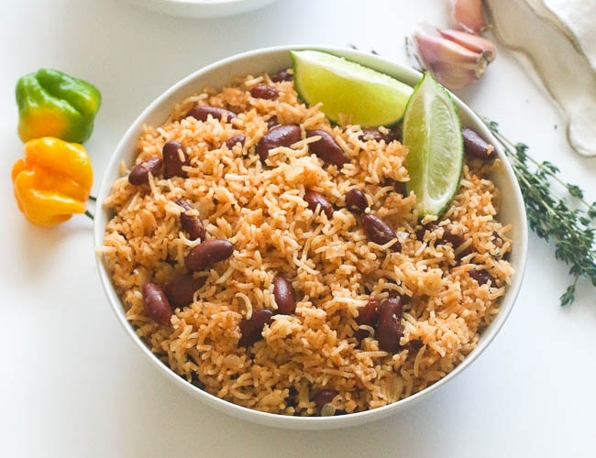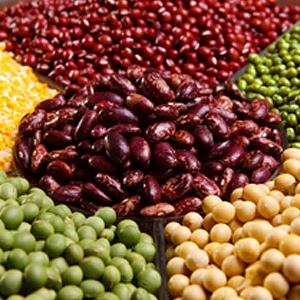Every day we hear terms such as ‘food shortages’, ‘sustainability crisis’, ‘food prices soaring out of reach’. Economists have been telling us it’s almost too late to head off a global climate catastrophe not seen since the last ice age. How will you adapt to survive?
 Caribbean Rice and Beans: All dolled up with nuts, herbs, spices and
Caribbean Rice and Beans: All dolled up with nuts, herbs, spices and
a squeeze of fresh lime… Don’t overlook the potential of adding
other fresh fruits and veggies. (Think: Asian Fried Rices!)
About a decade ago, scientists started predicting we would soon be facing a global climate catastrophe, with all the consequences, by 2050 if we didn’t start taking steps immediately. We’re still just talking about it, but the first symptoms have already raised their monstrous heads. And the same economists are saying, because we haven’t started making preparations to meet the challenges of the looming crisis, it may impact us harder than it otherwise would. Not to mention take longer to resolve, at a cost many times greater than it might have if we’d reacted earlier.
COVID thrust us into the soup pot
We might still be comfortably ignoring the issue if COVID19 had not come upon us in the winter of 2020. It was the worst thing, public health wise, that we had faced since the 1919 flu, they said. Fatalists and fundamentalists said it might not be just a coincidence – but a harbinger of the end of the world. Now, most so-called experts warned that the shortages and insecurities they already foresaw might already have arrived (at least, the forward scouts of the main hordes), rather than in 2030 0r 2040.
The other side of the coin on which COVID claimed ‘heads’ is the climate crisis, as we’ve already mentioned. Together, COVID and Climate have combined to set us up for interlocking situations we’re not coping with well at all. the climate change juggernaut has delivered us several consecutive years of rising temperatures during which serious storms (including tornadoes and hurricanes) have grown in tensity and destructiveness. And the wildfire seasons around the world have been getting worse and worse due to record droughts they triggered.
More to the point of our theme today, the climate issues have caused record crop failures and food shortages that not only caused food shortages further up the food chain, but may have dealt a death blow to many small and medium-sized fruit and veg growers and animal protein raisers. That’s going to mean long-term shortages and continuing higher costs. Not to mention higher collateral unemployment.
What the experts say we should be doing
The fad (or trend, depending how much you have invested in ‘faux meats’) was also delayed until potential innovators and investors felt they could safely dive into that pool. As a result we may be a decade behind the emergence of the need for those ‘bridging’ products. Some folks are saying we must embrace whole-hog the purely veg diet schemes much of the world has already been relying on for healthy, balanced nutrition for centuries (even millennia).
The main problem there is, meat lovers (as many affluent westerners have been raised to be) are having trouble getting their heads around the idea of beans and grains as straight-swap replacements for red meats, poultry, fish and seafood.
And perhaps not enough agricultural scientists are working hard enough on increasing plant food yields (and keeping prices down) as there should be.
Will the Chinese be our saviours?
I’ve noted recently that Chinese scientists are in the forefront exploring the realms of plant food production optimization. Not a surprise, I suppose, since they have the largest population of any country in the world to feed.
Nevertheless, their recent concerted work on increasing rice yields and engineering new varieties of rice that will grow in salt water have given all vegetarians hope for their intertwined futures. Now, lets get onto similar development programs for pulses (beans, peas, lentils, etc.) that will ensure the availability of complete plant-based dietary protein combos for everyone on the planet.
The only red herring in the net is… Will people embrace vegetarianism without first getting seriously close to starvation – holding out for some highly unlikely meat renaissance most of us know is never coming?
My take
The responsible, and simple solution is to get our families ready for the switch to veg diets by starting now to slowly phase in classic veg dishes and food styles from cuisines that already do veg big. Asian cultures have spent thousands of years perfecting techniques and spice masalas (blends) that are proven to work and which folks will eat – day after day if they have to. Two thirds of the work has already been done!
Remember that spicy food does NOT have to be hot, either. It’s nice sometimes. But not too much heat. You’ll never find me within a mile of a hot chili-eating contest!
Review the cuisines of North and Central Africa. Delve into the specialties of France, Spain and Italy. Indulge yourself in the unique flavours of Central Europe: paprika, cumin, coriander, caraway seeds, mustard black pepper and so on. And do make sure you reprise the flavours of India and Southeast Asia. They may well be too hot for you. But if the Brits (largely responsible for bringing them to Western Europe) can dial them down to a level acceptable to their delicate palates, so can you!
Muse on that!
Maggie J.

